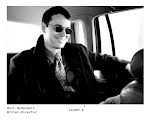Further Thoughts on Donald Rosenberg's Law Suit
(see Cleveland UnPlain Dealer 8•15•10 below)
What was the point of Don Rosenberg suing his own
newspaper for taking him off the Cleveland Orchestra
beat?
Strange as it may sound, it may have been the only
way for Rosenberg to fulfill his function as a reporter and
to cover - or in this case uncover that which The Cleveland
UnPlain Dealer would dearly have liked to cover up -
i.e., the story of how the Cleveland's leading newspaper
came to let the Cleveland Orchestra dictate how
music director Franz Welser-Möst would be reviewed.
The great Chicago labor lawyer and writer, Tom
Geoghehan, has taught us that the underdog must
often file lawsuits they know they can not win - even
though the moral right is on their side - not to win in
the courts but precisely to move the issue from the
judicial courts to the court of public opinion.
Donald Rosenberg needed to file his lawsuit for
a related reason: not to win; but to make sure
that editors and publishers know they can pay
a price for kow-towing to the powerful.
Rosenberg has stood up for all the critics in
America whose editors certainly don't want to
face the same fate that has now befallen Susan Goldberg,
the editor of who put the Un in front of Plain Dealer.
Simply put, this one decision will define her career
It is her legacy. She has proven that an editor has
a right to muzzle any writer on her staff who writes
something the rich and powerful don't like, but I
doubt it's the legacy she would have chosen.
Most journalists have idealistic streaks, or they
would have chosen more remunerative fields,
and I picture Ms. Goldberg as a girl imagining
herself fighting corruption and standing up for
the truth against the powerful. Life is complicated
and somehow she ended up on the wrong side of this
one.
She has defended herself saying she sensed a
closed mind in Rosenberg's writings. It sounds like a
fair reason to reassign a writer, but if she really
felt that Rosenberg had lost his objectivity, the
least she should have done was let a very respected
critic write a goodbye column in which he was
not only allowed to use the words Cleveland and
Orchestra together, but also in which he could
have justified himself and let readers decide if she
were right or wrong.
In the end she felt enough in the wrong to fear
his pen as much as she feared the Plain Dealer's and
The Cleveland Orchestra's interlocked boards.
This fear is evident in the restrictions she has put on
what Rosenberg can write even away from his beat of
reviewing the Orchestra, and she didn't have the
nerve to let him write that necessary farewell. She
must have realized that not only The Plain Dealer but
her own career would tarnished if he had his say.
It is this failure of nerve by which her career
will be remembered and defined. But what
about Rosenber's legacy?
Editors and publishers beware: Donald Rosenberg
has shown critics how to cover the stories their
own papers would like to bury.
- = >
Subscribe to:
Post Comments (Atom)

No comments:
Post a Comment